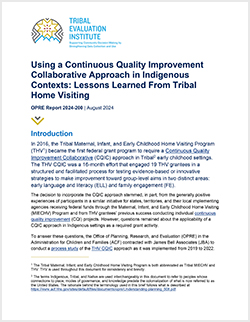Using a Continuous Quality Improvement Collaborative Approach in Indigenous Contexts: Lessons Learned From Tribal Home Visiting
Project: Tribal Evaluation InstituteA Continuous Quality Improvement Collaborative (CQIC) approach provides a structured, facilitated process for testing strategies to work toward group-level aims. In 2016, the Tribal Maternal, Infant, and Early Childhood Home Visiting (THV) Program became the first federal grant program to require a CQIC approach in tribal early childhood settings.
This report shares results from a process study of the THV CQIC approach as it was implemented from 2019 to 2022. Highlights include—
- How the CQIC approach adapted to tribal contexts
- The power of peer engagement across tribal programs
- Results and challenges, including pandemic-related obstacles
- Steps to improve feasibility and effectiveness
Overall, study participants reported that participating in the THV CQIC helped them make program changes that improved their ability to serve families and strengthen program processes in related areas. Their feedback also pointed toward implications for others considering a CQIC approach:
- Ensure sufficient resources are committed upfront by building in an extensive planning period, allocating funding for appropriate staffing, and devoting time to creating resources
- Prioritize a culturally informed and collaborative approach to developing the structure, activities, and resources that are a part of a CQIC initiative within Indigenous contexts
- Work closely with partners to identify meaningful and feasible measures that limit burden, align with the chosen topic, and can accurately reflect improvements


